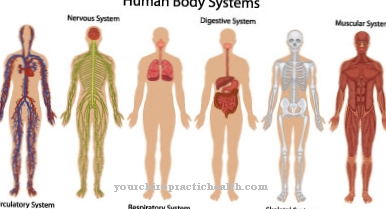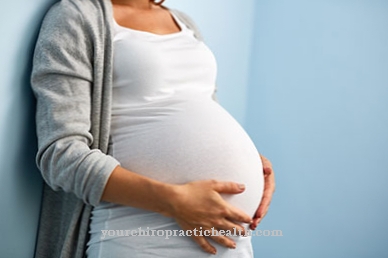Ulcers can develop anywhere on and in the body. The stomach and small intestine are particularly often affected by an ulcer. A Intestinal ulcer is usually located in the duodenum, the duodenum. In medical terminology, a duodenal ulcer is called a duodenal ulcer.
What is an ulcer?

© Milton Oswald - stock.adobe.com
An ulcer is a deep defect in the skin or mucous membrane. It usually arises on previously damaged tissue structures and has a very poor tendency to self-healing.
With an intestinal ulcer in the duodenum, persistent inflammation destroys the mucosal tissue. At the onset of the disease, the lesions affect only the top layers of the intestinal lining.
If the inflammatory change is left untreated, the destruction of the tissue can spread to the muscular layer of the duodenum.
causes
Colon ulcers are more common in some families. Therefore, there seem to be genetic predispositions that favor the development of an ulcer in the intestine.
In most cases, the triggers are the digestive enzyme pepsin and gastric acid. These act on the previously damaged mucous membrane in the stomach or in the duodenum directly behind it and cause inflammation. The mucous membrane that lines the stomach and intestines normally protects the organ walls from the aggressive stomach acid. But psychological stress, stress in the family and at work, alcohol consumption and smoking can damage the protective function of the mucous membrane.
The mucous membrane of the stomach and intestines is also stressed by taking certain medications such as non-steroidal anti-inflammatory drugs (e.g. diclofenac, ibuprofen). Just taking common painkillers with the active ingredient acetylsalicylic acid (e.g. aspirin) already has negative effects on the protective function of the intestinal mucosa.
In recent years it has been observed that infection with the pathogen Helicobacter pylori also plays a major role in the development of intestinal ulcers. Inflammatory lesions also occur when the intestinal tissue is undersupplied due to circulatory disorders.
Symptoms, ailments & signs
An intestinal ulcer can express itself through various, mostly unspecific symptoms. Injuries to the intestinal mucosa are manifested, for example, by pain in the affected region or a feeling of fullness. Typical gastrointestinal complaints such as nausea, vomiting and loss of appetite can also arise.
In individual cases, duodenal ulcers cause severe, boring pain in the abdomen, which typically occurs on an empty stomach or at night. The symptoms are usually reduced with a meal. It is different with gastric ulcers, which cause pain and an unusual feeling of pressure in the abdomen after eating.
An ulcer at the outlet of the stomach manifests itself as frequent vomiting and weight loss. Constipation, diarrhea and other typical symptoms and ailments can also occur. Any ulcer in the colon can cause bleeding, which can be recognized by the stool turning red or black. Often the blood is also vomited.
Regular, unnoticed blood loss can cause circulatory shock. Before that, there is fatigue and exhaustion. In a severe course with recurring bleeding, the patient's appearance also changes: The skin becomes pale, the eye sockets turn dark and hair loss may occur. These symptoms are accompanied by an increasing feeling of illness.
diagnosis
The symptoms that the patient expresses with an intestinal ulcer are often burning and boring pain in the upper abdomen. If the pain improves after eating, it is a typical symptom of a duodenal ulcer.
In addition to irregular bowel movements, a constant feeling of fullness, nausea and vomiting, weight loss can also occur in the advanced stages of the disease. If the intestinal ulcer is left untreated, bleeding and perforations can occur in the affected area of the intestine. The diagnosis of a duodenal ulcer is confirmed by an endoscopy.
Endoscopic removal and examination of a tissue sample is important in order to rule out a carcinoma. The infection with Helicobacter pylori can be detected with a breath test, the Helicobacter urease test or directly on tissue samples taken. In the meantime there is also an antigen detection in a stool sample and the detection of antibodies in the blood serum.
Complications
An ulcer can cause a number of complications. First of all, there is a risk of bleeding, which can lead to anemia and, as a result, severe deficiency symptoms. A high blood loss can lead to circulatory shock.
In the long term, bleeding in the gastrointestinal tract can cause chronic anemia, which is associated with fatigue and a decrease in mental performance. A gastric perforation, which is associated with severe inflammation of the peritoneum and severe pain, rarely occurs.
In addition, an intestinal ulcer can perforate an adjacent organ and cause severe inflammation and stress reactions.If a blood vessel is damaged, life-threatening ulcer bleeding can occur. Colon ulcers at the stomach outlet can narrow as they heal. As a result, the food can no longer be passed on unhindered and the patient has to vomit.
As a result, there is weight loss and thus sometimes further complications. Surgical removal of an intestinal ulcer can injure the intestinal walls as well as nerve cords and vessels. Prescribed medication can cause severe reactions such as nausea and vomiting. In addition, allergies and intolerances can occur and slow down the recovery process.
When should you go to the doctor?
Growth in the abdomen or changes in the skin in the intestinal region must always be clarified by a doctor. If there is additional pain that persists for several days or increases in intensity, medical examinations must be initiated. If there are repeated symptoms of diarrhea that cannot be traced back to an unhealthy diet, it is advisable to consult a doctor. Changes in stool, discoloration, bleeding in the area of the anus or inexplicable flatulence should be examined and treated.
The causes of persistent heartburn, a feeling of fullness or a feeling of pressure in the abdomen should also be clarified by a doctor. Unplanned weight loss or an unusual loss of appetite that persists for several weeks is a medical concern. General malaise, increased body temperature, dizziness, nausea and vomiting should be examined by a doctor if they occur over several days.
Since an early diagnosis determines the further course of the disease and recovery in the case of an intestinal ulcer, it is advisable to consult a doctor as early as possible if symptoms occur. A vague and clearly explainable body feeling is enough to go to a doctor. If the usual performance drops for no apparent reason or if emotional problems set in that cannot be explained, a doctor should be consulted.
Doctors & therapists in your area
Treatment & Therapy
Treatment of an intestinal ulcer can take a long time. For long-term success, the patient's cooperation is necessary to eliminate triggers of an intestinal ulcer that are suspected in lifestyle or diet.
The patient should divide their food intake into frequent smaller meals throughout the day. Hot spices, alcohol, nicotine and coffee should be avoided until the ulcer has healed. Drug treatment is carried out with proton pump inhibitors (PPIs). They inhibit the formation of stomach acid. In the case of a proven infection with Helicobacter pylori, an antibiotic is also prescribed.
If the illness has a psychosomatic background, targeted psychotherapy can positively support the healing process. Nowadays, a stomach or intestinal ulcer is rarely operated on. Surgical intervention may only be necessary in the event of recurrences or complications.
Outlook & forecast
A colon ulcer can resolve in eight to twelve weeks without treatment. With a balanced diet and a healthy lifestyle, healing is also possible without the administration of medication. The self-healing powers of the organism can fight the causes of the intestinal ulcer and thus enable healing. The prognosis improves with the use of medical care. With antibiotics and acid inhibitors, the patient has the prospect of being symptom-free after five to ten weeks.
The main cause of an ulcer is Helicobacter pylori infection. With antibiotic therapy, this leads to a cure in far more than half of the cases. If the treatment does not work or is not sufficient, it is then repeated up to three times. The success rate with this approach is very high and is around 95%.
In very rare cases the bacterium is still detectable after a third repetition. Without medical care, patients are at high risk of relapse. In about 40-80% of the cases, untreated people develop an intestinal ulcer again. There is also a risk of chronic disease. If there is a psychological cause, the otherwise very good prognosis worsens. Persistent stress or strain can make healing difficult or prevent it.
prevention
A recurrence of the colon ulcer can be prevented by taking medication as directed by the doctor, eating a healthy diet and living a lifestyle without excessive negative stress. Smokers should completely refrain from consuming nicotine.
The recommendation is also to integrate sufficient exercise into everyday life. It helps to break down harmful stress hormones quickly. It is important that the patient learns again to have the ability, even in stressful times, to deliberately allow himself to be quiet and relaxed.
Aftercare
After the therapy has been completed, regular check-ups serve to rule out a recurrence. Affected people whose place of residence is not close to the clinic can discuss a referral to a resident gastroenterologist and other specialists with the treating physician. They are made familiar with the individual diagnosis and therapy via a discharge letter and can then carry out all check-ups.
The frequency and type of examinations are determined individually based on the stage of the disease. Patients in whom the increase in girth was detected at an early stage do not usually require intensive follow-up care. For them, a simple colonoscopy is sufficient, which takes place for the first time after six months and is later carried out every five years. It mainly serves as a precaution against a new illness.
All other affected persons have to undergo colonoscopy every six months within the first two years after the start of therapy, as the likelihood of a relapse is greatly increased during this period. Annual checks with colonoscopy are then sufficient. According to the current state of science, the risk of a relapse after five years is extremely low.
Nevertheless, it is recommended to have a colonoscopy every five years as a preventive measure. However, if symptoms arise between follow-up examinations, the patient should not wait until the next appointment, but rather contact his doctor immediately.
You can do that yourself
If you have an ulcer, prevention is the best treatment. After the ulcer is diagnosed, the cause should be identified and corrected as soon as possible. Most gastrointestinal diseases are caused by an unhealthy diet or stress. Both of these can be remedied by making lifestyle changes. Dietary measures can be worked out together with a doctor or a sports medicine specialist and, in the case of an intestinal ulcer, make sense during the illness.
Other measures such as changing the environment or exercising should be implemented in consultation with the responsible doctor. Further strategies are recommended for chronic pain: regular showers, breathing exercises or acceptance. In the long term, most intestinal ulcers can be treated, but chronic gastrointestinal complaints may remain. These can sometimes also be counteracted by a healthy and balanced diet and other measures.
However, those affected should also find out more about the disease and talk to other sufferers. The doctor in charge can provide further information on self-help groups and refer those affected to a therapist if necessary. Regular discussions with friends and family members are also useful in order to come to terms with and accept a serious illness.



























